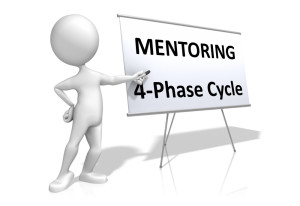
by Center for Mentoring Excellence | Aug 4, 2015 | Facilitating Learning, Making Mentoring Work For You, Mentoring Communication, Mentoring Relationships
“A story is the shortest distance between two people.”
— Pat Speith
Sharing personal stories, successes and challenges serves multiple purposes in a mentoring relationship.
- Stories build trust, keep a mentoring relationship real, create a comfort level, and give your mentee “permission” to share their own.
Hearing stories about your career and personal challenges provides a powerful impetus for mentees to take action.
- Your setbacks remind them that successful people do face and overcome roadblocks.
By sharing strategies for solving problems and dealing with adversity your mentee learns from your experience.
- According to psychologist Uri Hasson, “Anything you’ve experienced, you can get others to experience the same.” People accept ideas more readily when their minds are in story mode.
Telling your stories and sharing your learning demonstrates openness and respect, and builds trust.
- It creates points of connection, a shared language, and grist for ongoing conversation.
Your story motivates mentee self-reflection.
- It activates their brain cells, stimulates critical and creative thinking, and increases their self-awareness.

So, what is your story?
How can you tell it in such a way that it invites conversation, reflection and learning?
Encourage your mentees to share their stories by:
1. Sharing yours
2. Thinking, in advance, about what you really want to know about them
3. Asking specific questions to encourage them to reflect on their career path, specific experiences, previous successes, and work projects
4. Listening closely to what they say, how they say it, and the words they use to describe their experiences
5. Asking probing questions to encourage them to reflect on the lessons they have learned from their stories
by Center for Mentoring Excellence | Apr 28, 2015 | Growth and Development, Making Mentoring Work For You, Mentoring Relationships
Our recent annual Mentoring Matters Reader Survey revealed dozens of best practice topics. This blog is the first in our series of mentoring best practice posts soon to follow. Based on our survey results, here are the top ten:
- Start by getting to know your mentee
- Make sure you take time to get to know your mentee before you jump into the work of mentoring. Nothing of substance will happen until you establish a trusting relationship.
- Establish working agreements
- Agreements lay the foundation of a mentoring relationship. Build in basic structures about how you will work together moving forward. Make sure you and your mentee agree on ground rules.
- Focus on developing robust learning goals
- The purpose of mentoring is to learn. Learning is also the payoff. Make sure the mentee’s learning goals are worthy of your time and effort. Developing robust learning goals takes time and good conversation.
- Balance talking and listening
- It’s easy and natural to want to give advice, especially because you’ve “been there and done that.” But mentees want more than good advice. They want you to listen to their ideas as much as they want to hear what you have to say.
- Ask questions rather than give answers
- Take the time to draw out a mentee’s thinking and get them to reflect on their own experience. Ask probing questions that encourage them to come up with their own insights.
- Engage in meaningful and authentic conversation
- Strive to go deeper than surface conversation. Share your own successes and failures as well as what you are learning from your current mentoring relationship.
- Check out assumptions and hunches
- If you sense something is missing or not going well, you are probably right. Address issues as soon as possible. Simply stating, “I want to check out my assumption which is … ” will prevent you from assuming your mentee is on track.
- Support and challenge your mentee
- Work on creating a comfortable relationship first before you launch into the uncomfortable stretch needed for deep learning. Mentees need to feel supported (comfortable) and yet be challenged (a little uncomfortable) in order to grow and develop.
- Set the expectation of two-way feedback
- Candid feedback is a powerful trigger for growth and change. Set the expectation early on. Be prepared to offer candid feedback, balanced with compassion. Model how to ask for and receive good feedback by asking your mentee for specific feedback on your own mentoring contribution.
- Check in regularly to stay on track
- Keep connected and develop a pattern of regular engagement. Both partners need to be accountable for following through with agreements. By holding an open, honest conversation about how you’re doing and what you need to do to improve, you encourage mutual accountability and deepen the relationship.
What do you think? Did we miss any best practices? Let us know!
Keep a lookout for our next blog later this month, Top Ten Best Practices for Mentees.
by Center for Mentoring Excellence | Aug 25, 2013 | Uncategorized
Some of the many mentoring benefits for individuals include accelerated learning, expanded and diverse perspectives, increased tacit organizational knowledge, additional insights about other business units, improved skills in specific areas ( for example, listening, building relationships). Mentoring also offers individuals a trusted sounding board, role model, and/or go-to individual. Individuals often say that as a result of mentoring they feel more self-aware and self-confident, connected more closely to the organization, and find work more satisfying and meaningful. (more…)
by Center for Mentoring Excellence | Aug 12, 2013 | Uncategorized
Mentoring is a proven way to promote employee growth and development, accelerate learning, fast track leadership, improve retention, elevate morale, strengthen recruitment and promote diversity. Too often, people step into their mentoring roles without sufficient training, relying on their good intention or past experience to carry the day.

Successful relationships require a mentor to be adept at building trusting relationships with mentees, who often may be intimidated working with a more senior leader, or uncomfortable sharing vulnerabilities or challenges. Mentors need to understand the key components of mentoring, including negotiating agreements, creating accountability assurances and how to avoid common pitfalls and that tend to upend mentoring relationships.
Meet Mike, Kim and Jeff. Each of them had good intentions but missed the mark because they weren’t fully prepared for their role.
In the past, Mike had informally mentored a number of junior associates, and enjoyed these relationships. However, this was the first time he had actually participated in a formal mentoring relationship. After four months, his mentee, Aaron, had made little progress. Aaron’s low level goals were getting him nowhere and he frequently cancelled meetings at the last moment. More than once, Mike encouraged Aaron to become a more active participant in his own growth and development, but nothing seemed to shift. Mike was not enjoying this relationship.
Kim had been assigned as Trina’s mentor. Since she and Trina had worked together on projects, Kim thought it would be easy to mentor her. She assumed that they could skip over the relationship-building component and dive right into goal setting. Kim was confused when Trina seemed to be withholding, and profoundly disappointed when, after three months, the relationship completely stalled out.
Jeff held a deep passion for helping young talent in the company come up through the ranks. He took great pride in his role as a mentor and relished the opportunity to share his wisdom and provide sound advice. He always had a list of business books and journal articles to recommend to help mentees acquire leadership skills. Despite his own enthusiasm for mentoring, his mentees never seemed as satisfied or committed. He didn’t understand why.
Mike, Kim and Jeff all had good intentions. They all wanted to help their mentees grow and develop. Like most mentors, they assumed their past experiences with informal mentoring would be sufficient. As it turned out, they could have each benefited from mentoring training.
With training, Mike would have discovered why Aaron was lacking enthusiasm and energy for achieving his goals. He would have learned how to set expectations up front that put the mentee in the driver’s seat. He would have learned strategies to help his mentee set robust and SMART goals that facilitate growth and development.
Even though Kim knew Trina in a work setting, a successful mentoring relationship requires trust and safety. Mentoring training would have helped Kim understand the importance of taking the time to set the stage for the work ahead. She would not have made the assumption that Trina felt safe enough to be open and honest with a senior colleague. Kim would have learned which questions to ask to get to know Trina in a different way. She would probably have been surprised to learn that she had skipped over the most important phase of the mentoring cycle, preparing the relationship.
 Jeff was driving his mentoring relationships instead of creating a partnership with his mentees. While his mentees might have appreciated the many resources he shared with them, mentoring isn’t about reading books and journals. Mentoring isn’t about listening to the wisdom of the mentor and hearing about their experiences. In this kind of relationship, the mentee never fully engages. Had Jeff had some training under his belt, he would have discovered that open two-way conversation was an essential part of mentoring right from the get-go. He would have learned that the only way for mentees to achieve good results is to feel a sense of ownership in the relationship. Knowing more about the different learning styles of his mentees would have helped him better support them in their learning.
Jeff was driving his mentoring relationships instead of creating a partnership with his mentees. While his mentees might have appreciated the many resources he shared with them, mentoring isn’t about reading books and journals. Mentoring isn’t about listening to the wisdom of the mentor and hearing about their experiences. In this kind of relationship, the mentee never fully engages. Had Jeff had some training under his belt, he would have discovered that open two-way conversation was an essential part of mentoring right from the get-go. He would have learned that the only way for mentees to achieve good results is to feel a sense of ownership in the relationship. Knowing more about the different learning styles of his mentees would have helped him better support them in their learning.
Learning Point: Being an effective mentor requires more than just good intention. It also requires knowledge, competency and skill to be successful. Mentoring training plays a key role in the development all three of these important keys to success. It also impacts the quality of mentoring relationships. Mentors who are well-prepared do indeed report more fulfilling and mutually satisfying mentoring relationships.






